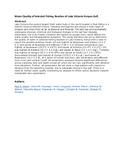| dc.contributor.author | Orina, Paul S. | |
| dc.contributor.author | Onyango, David M. | |
| dc.contributor.author | Lungayia, Henry | |
| dc.contributor.author | Oduo, Andrew | |
| dc.contributor.author | Sifuna, Anthony W. | |
| dc.contributor.author | Otuya, Petronila | |
| dc.contributor.author | Owigar, Rosemary A. | |
| dc.contributor.author | Kowenje, Chrispin B. | |
| dc.contributor.author | Hinzano, Sheban M. | |
| dc.date.accessioned | 2021-07-15T09:12:42Z | |
| dc.date.available | 2021-07-15T09:12:42Z | |
| dc.date.issued | 2020-01-01 | |
| dc.identifier.uri | https://doi.org/10.4236/oje.2020.101002 | |
| dc.identifier.uri | https://www.scirp.org/journal/paperinformation.aspx?paperid=97896 | |
| dc.identifier.uri | http://r-library.mmust.ac.ke/123456789/1780 | |
| dc.description.abstract | Lake Victoria the second largest fresh water body in the world located in East Africa is a shared resource between Kenya, Tanzania and Uganda and enjoys a wide range of streams and rivers from as far as Burundi and Rwanda. The lake has environmentally undergone physical, chemical and biological changes in the last four decades, particularly rise in its trophic condition and decline in oxygen level, which affects the water quality and fish population dynamics. This study therefore set out to determine the quality of water in selected fishing beaches of Lake Victoria, Kenya with a view to report the possible pollution levels. pH was highest at Nyamasari and Kotieno (9.3 ± 0.1) and lowest at Nyachebe and Kichinjio (7.08 ± 0.1) whereas temperature was highest at Nyamasari (29.5°C ± 0.0°C) and lowest at Kichinjio (23.4°C ± 0.2°C). DO was highest at Kotieno (10.3 ± 0.2 mgL) and lowest at Seka (2.4 ± 0.1 mgL). Turbidity was highest at Uyoga (125.5 ± 0.90 NTU) and lowest at Osieko (2.7 ± 0.1 NTU). Ammoniacal nitrogen was highest at Dunga (1278.3 ± 0.8 μ∙gl-1) and lowest at Nyamasari (12.4 ± 0.8), all a factor of human activities, lake substratum and effluents from rivers and surface runoff. All parameters assessed showed significant differences across sampling sites and depth except pH which did not vary significantly with distance from lakeshore. Further, all parameters did not show a clear pattern with respect to distance from the lakeshore possibly due to adequate mixing in the gulf. There is a need for further water quality monitoring by seasons to inform policy decisions towards sustainable lake exploitation. | en_US |
| dc.language.iso | en | en_US |
| dc.publisher | Scientific research | en_US |
| dc.subject | Water, Quality, Selected, Fishing, Beaches, Lake ,Victoria, Gulf | en_US |
| dc.title | Water Quality of Selected Fishing Beaches of Lake Victoria Kenyan Gulf | en_US |
| dc.type | Article | en_US |

